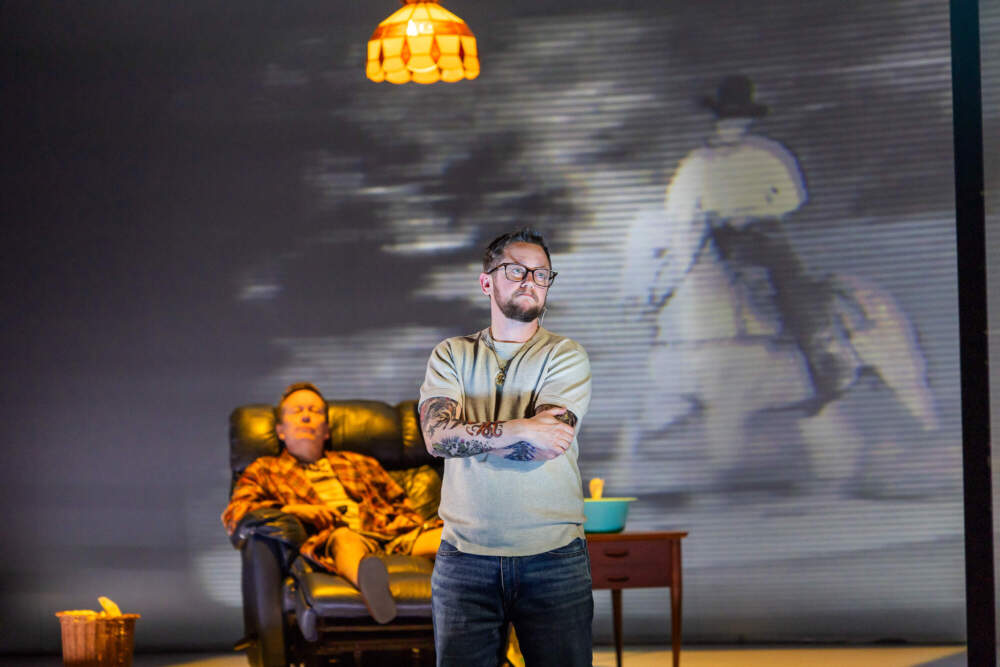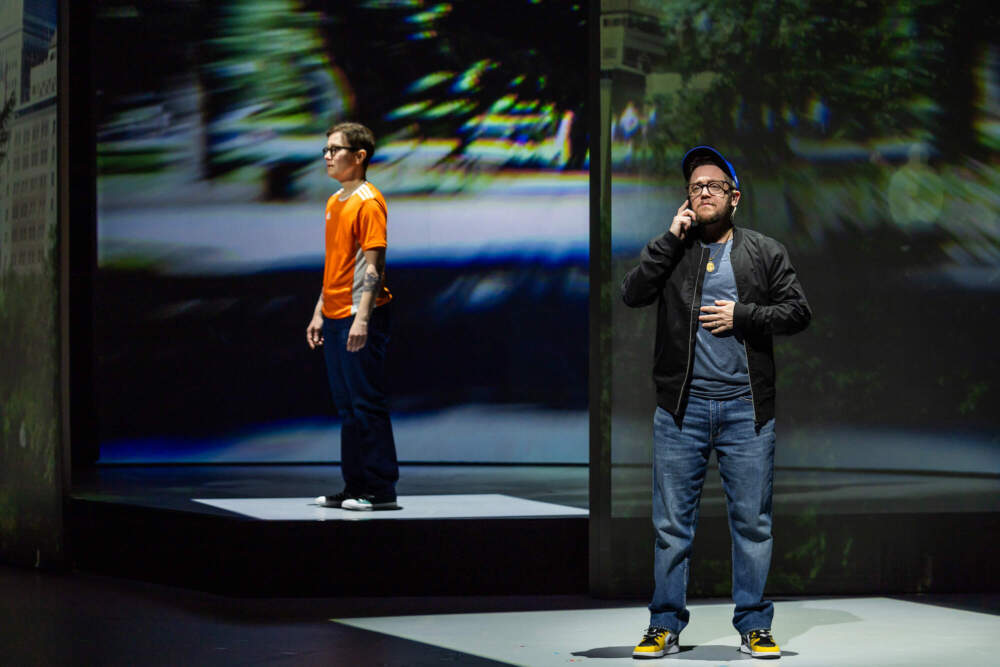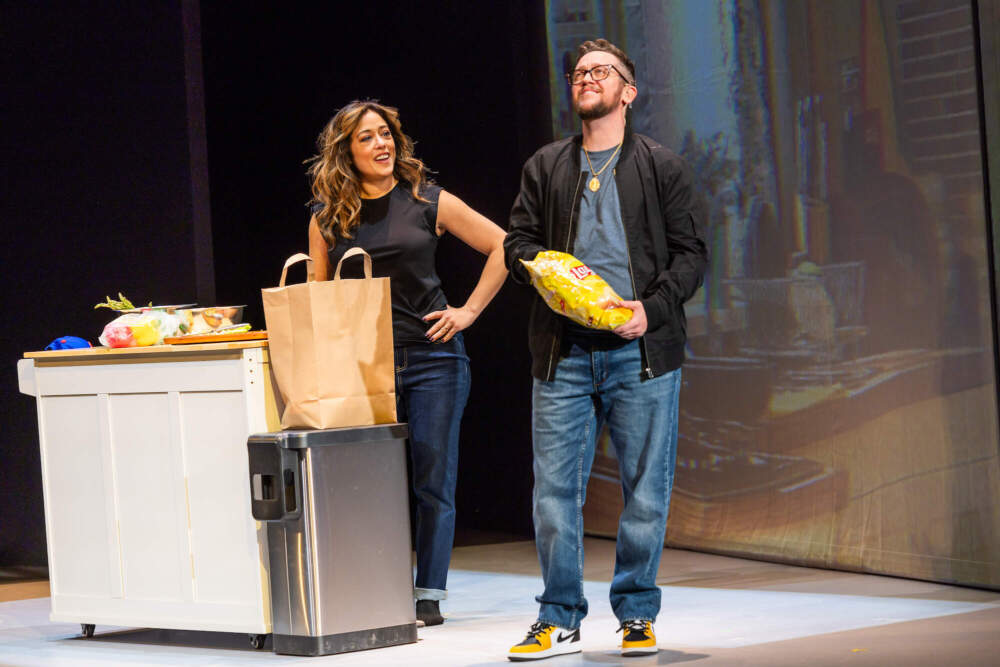Advertisement
Life imitates art for actor Petey Gibson in A.R.T.’s ‘Becoming A Man’
Resume
I met Petey Gibson more than a decade ago. At the time, I was working as a waitress at Oberon, a bar in Harvard Square that doubled as a second stage for the American Repertory Theater. Petey was a regular onstage in those days, an impish sprite who mixed up drag and comedy and character acting in a manic cocktail. His most memorable bit was as an 86-year-old ex-vaudevillian named Mary Dolan, notable for her old-fashioned Boston accent and utterly filthy mouth.
Like many an Emerson College alum, Petey, who grew up in Massachusetts, left Boston to seek his fortune in Hollywood. Last year he scored a role on Fox’s new series “Alert: Missing Persons Unit.” Recently, he returned to Cambridge as the lead in the A.R.T.’s world premiere of “Becoming A Man: A Story of Transitions,” which runs through March 10.
Directed by Diane Paulus and P. Carl, the play is based on Carl’s memoir chronicling his decision, at age 50, to begin living openly as a transgender man. In the play, Carl’s sudden ability to “pass” as a man sends him on a kind of chauvinist rumspringa, throwing into question his feminist convictions as well as his wife Lynette’s own identity as a lesbian.
I caught the final preview of the show, in which Petey appears in nearly every single scene. We arranged to meet up the following Monday, but he emailed that weekend to postpone a day so he could rest his voice. We ended up chatting for over an hour in one of the A.R.T.’s empty rehearsal rooms about coming home to Boston, what it’s like to be a trans actor in Hollywood today and Petey’s own midlife transition.
This interview has been edited and condensed.
Amelia Mason: How's your voice doing?
Petey Gibson: It's not the greatest, but it's alright.
Yeah? Are you worried about hurting it?
Yeah, it's just that my vocal cords hurt. Because when they thickened with the T [testosterone], it's — I need to get a vocal coach, is the very short version of it. Because I still talk as though my vocal cords are thinner and more open, but I'm pushing air past them, and I think my cords are rubbing on each other, and it's very, very painful, and it sometimes hurts all the way into my lungs.
Can you remind me again how long ago it was that you moved to LA?
Twelve years, I think. So I left Boston right before I was about to turn 30. … I feel like it all happened exactly how it was meant to. Boston was such a nurturing environment to make whatever insane thing you could possibly think of and audiences come out and support.
When I went to LA, I couldn't get anyone to come to my shows. It was really shocking to me. Because in my mind, you know, Boston was a small town where we made underground art, but LA was where Hollywood was, and that's where people really valued art.
And probably there was a bit of a saturation in terms of shows people are putting on out there.
Yes, and I feel really lucky that I didn't go to LA sooner because I was making art for myself and my friends. Like, I wasn't making art thinking what casting director was in the audience. And I think that would have really changed what I was doing. I knew I could do a show at Oberon and sell it out and there were people who had been coming and watching my stuff for years and I could throw something insane up and know that it might not work and not think, ‘Oh, this will hurt my career’ or ‘Oh, I don't know who will see it’ or ‘I can't fail.’ I failed a thousand times on Boston stages and it was the greatest because you only really grow when you really bomb.
What's it been like then coming back this time around?
I'm having the most surreal experience. To be living in Harvard Square, doing this show at American Repertory Theater, being directed by Diane Paulus herself, doing this transmasc play – I used to wait tables at Cambridge Common. Like, I am a blue collar, scrappy queer kid from Massachusetts.
I feel like this is always the way, that sometimes you have to leave in order to come back. … So I also am sort of marveling at myself, that I feel really aligned. I feel really capable. And I think sometimes it just takes hitting your forties before you know what you're capable of.

But you also have to become capable of things because you have to live and practice and do stuff, right?
It's like the older I get, the more I'm aware that everyone is on a completely different timeline. And the journey is the journey. Like I couldn't be doing what I'm doing if I hadn't done what I'd done. Do you know what I mean?
I transitioned relatively later in life. I was 37 when I started my medical and hormonal transition and social transition. And then so much of my transition happened within the pandemic. And so when I came out of the pandemic, I suddenly was just a quote unquote, “passing man.” I had a very surreal experience. And Hollywood, and media in general, has just started telling trans stories, just started telling transmasculine stories as well.
What has it been like to embody this character [when] the whole play's about that exact experience [of transitioning later in life]?
It’s P. Carl's experience and he was older than I was. So he transitioned at 50 and I think so much of the play centers around his grief and devastation, at what he says is he sort of missed his life. … At least for me, I didn't know what I was missing until I felt it, and then all of a sudden you feel, for the first time, aligned. And you think, “What was I doing? How did I even survive before?” I actually didn't know what it felt like to be fully alive. I didn't know what it felt like to be fully present.
Can you tell me a bit about the process for getting this role?
The process for “Becoming A Man” started about a year ago. We had a week-long workshop in New York City. They [had been] looking for their Carl, and they had auditioned people and nothing was really quite hitting. And then, [P. Carl] is an avid birder and was out birding. And an old couple that knew him were like, “Hey, we didn't know you were an actor.” And he's like, “I'm not an actor.” And they're like, “We could have sworn that we saw you on TV last night.” And they went on and on about it. So Carl looked me up on my show, “Alert,” and was like, “Wow, we do look a lot alike.” And then realized I'm trans. … So him and Diane [Paulus] and the casting team reached out to my team in LA and I did a Zoom interview on the last day of callbacks.
You're in almost every scene of this play. It seems like it requires a lot of stamina.
I haven't done a play in 24 years since I played Glinda the Good Witch in Barnstable High School's “Wizard of Oz.”
I just want to say, as someone who knew you before, that's perfect casting.
Thank you. … I leave the stage basically for, like, three minutes. There's only one scene that I'm not in and I'm changing my costume during that scene. It's wonderful, but it is a lot, and emotionally it's a lot. There's a lot of big themes that sort of echo some – you know, me and Carl share some traumas. So it also can be a lot to kind of wipe away at the end of the day because we're doing eight shows a week.
What are you going to do after it’s done?
Oh my god. I am going to curl up into the fetal position and have someone feed me pizza after this is done.
Aren’t you gluten-free now?
Shut up, Amelia. [laughs] Yes. Shout-out to Otto’s Pizza for making a gluten-free pie.
Did you get a chance to read P. Carl's memoir before you did the play?
I was sent an advanced copy of P. Carl's memoir because my best friend worked in the independent book space. This was before I even transitioned. She said, “Hey, I'm sending you this advance copy of this book. I think you should read it.” So I read P. Carl's book even before it came out, which is so wild. I didn't know him. There has been so much that feels kismet or just some sort of spiritual alignment that has brought me into this exact moment in time.
It's interesting because I read Carl's book right when it came out. And I had some issues with it. And I think it's ‘cause I wasn't ready to hear it. So after I transitioned, I reread it and it really resonated with me.

Do you mind saying anything more about what issues you had with it that didn't quite click before?
In his memoir, Carl has a lot of anger that doesn't know where to go. And I now understand the grief behind it and the frustration of trying so hard to build a life as quickly as you possibly can. Of going through a second puberty later in life. Of feeling like you're screaming, that no one can see you, and you finally feel like you're alive for the first time. And what do you do with that, and how do you get people to come onboard the way that you're onboard? I understand that now, as someone who transitioned, myself.
I think at the time I was nervous about, as I always am, I'm nervous about men's anger. In general I am, as most people are, very scared of masculinity when it is unhealed. And so, for me, in my first read, I felt nervous. I was like, “Uh oh, this is an angry trans person, and this is an angry man, and that scares me.” And my only [real] knowledge of trans men was Max on “The L Word,” who was given a horrible storyline. That was my understanding of what happened to trans people, was that they took testosterone, and they hated women and they were nuts.
And so, right now with this story, I'm really conscious of telling this particular story and knowing that I'm threading this needle of what it means to be a full and flawed and trying person. Because it's hard when niche or minority stories are told. There's so much more responsibility that you're holding because you're scared to be the, whatever it is, the angry Black person or the evil trans person. …I feel really privileged to be telling a story that is so nuanced, but I feel like we're threading this needle because Carl isn't perfect.
That's because Carl portrays himself that way. He reveals himself as, at times, very sexist, or at least saying sexist things. And angry, but angry for lots of understandable reasons – but still couched in problematic remarks that he makes. So you have more sympathy for him now, but also you are also trying to show him in the fullness of that moment, where he's being unkind to people or he's acting out. Is that hard to do?
Well, choosing yourself can look a lot of different ways. And I think for people who aren't in the practice of putting themselves first, it can be a really tough integration.
What do you mean by that?
I think when you spend 50 years or 40 years or however many years not putting yourself first, putting everybody else ahead of you and just thinking, “I'm gonna make myself as quiet as possible” – when you finally decide to turn on the lights and make yourself loud, it's messy. You're not in the practice of choosing yourself and so then it can look like self-centeredness or selfishness, which is sort of the negative connotation of something that's a little more nuanced. Which is like, “I am centering myself. I'm choosing myself. I'm allowing myself to flourish for the first time.” And it's messy.
And it happens with all people, not just trans people. Everybody, if they're lucky enough to choose themselves, goes through something like this. Trans people are just a really out-loud version of what is a tale as old as time. We have other words for it. We have midlife crisis, or we have, you know, a banker who decides to up and move to Vermont and make pottery. People do this all the time, they get to a point in their life where the screaming is so loud in their head because they're so misaligned with the life that they've built that they have to persist or die trying.
How did you approach portraying Carl?
I definitely have had to masc up a lot. Meaning like I am a lot more, um, uh, flitty. [laughs] Carl's a lot more butch than I am. But that's been really helpful for the character, to know, “How am I standing?” My spine is always straight onstage. Whenever I'm sitting, I'm manspreading. Whenever I'm talking, I am chest forward. And I think, “Yes, that's how Carl is,” and also that's the type of masculinity that I'm portraying. It's a very transmasc thing to be chest out. For a lot of us, or I'll speak for myself, I spent a lot of time trying to hide my body. I spent a lot of time in binders, or trying to hide my chest. And for me, being post-top-surgery and being on hormones, I felt like I grew four inches. I feel so alive and present and so that's something that I've really focused on onstage, is just, “How does this man relish taking up space?”
It was [also] striking to me that Carl gave so much space for Lynette to express her … feelings about being alienated from her own identity as a lesbian because he's transitioning, which is such a fraught dynamic. And I was like, “Whoa.” I feel like there must be trans people who would see this, or hear someone say some of the things that Lynette says and be like, “That's transphobic.”
I really think “Becoming A Man” is an invitation to a lot of different types of people having a lot of different types of transitions. This isn't a one-man show. I think that was really important to Carl, and to all of us, that all seven of us actors onstage are all having some sort of transition. We're navigating space together. So I think it's really important that this isn't a one-man show. I think it's really important that this is the story of multiple relationships told over a period of time, that Lynette has her own truth, that Carl has his own truth. That his best friend Nathan has his own truth, that his parents are involved. There's a lot of different relationships at play. And I think it was important to Carl to give everyone space to be human, to be imperfect, to try to make mistakes, to feel slighted.
I feel like the crux of the play is really about his relationship with Lynette. They have the same fight a bunch of times and they're kind of stuck for a while. And it's them trying to get unstuck, I feel like.
Well, I think there's a really classic story that's in everything, from every drama to every sitcom, which is a case of maybe inarticulate misunderstanding. Lynette doesn't ever say, “I'm afraid.” And Carl doesn't ever say, “I'm sorry. I can see that you're afraid.” … The meat of it is, “I'm really scared and I don't know what's going to happen.” And that, to me, is incredibly relatable and I think that's why our audiences are resonating so much with it. It's not just like, “Here's what trans looks like.” It's not that story. It's a story of, how can we grab at our lives, and live it? And who can come with us when we do?
This segment aired on March 1, 2024.
